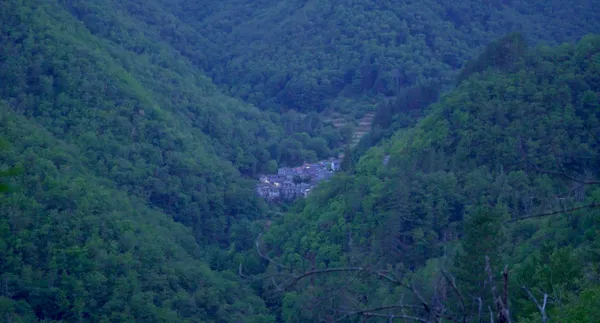Eye For Film >> Movies >> Bosco (2020) Film Review
Bosco
Reviewed by: Andrew Robertson

Bosco, fully Bosco di Rossano. About a third of the way between Genoa and Florence, up in the hills. It sits closer, much closer, to the boundary between Tuscany and Liguria than almost anything else. It is a village in the mountain, nestled in a valley once thick with chestnut trees. By the numbers, and there are plenty, it is both small and getting smaller. It is also far away, some 10,800KM and change from Montevideo.
Alicia Cano's film is transporting. There are numbers aplenty, 123 houses, 639 graves, but importantly 13 inhabitants. Family too. The graves bear just a few names, Menoni the most important. Founders of the time, past documents. There is older footage, aspect ratio the transition from one flavour of digital to video. Further again super 8mm another of those layers of memory that film brings with it. Medium and message and both from the past, the dead.

There is blur in the rain, Bosco would be picture postcard but it no longer looks like the picture in the postcard. We see sluices opening in the past, wheels turning, industry now gone. Blurred by time and distance and cataracts there is musing "who knows who inherited these landscapes". Cano's scarf is one of the few things Orlando can still discern, but the subtitles have it wrong when they say it is brown. It is marron, chestnut. The crop upon which Bosco was founded, in a valley now overgrown and empty.
Nature abounds, the domesticated sheep and goats and occasional dog, the cat waiting patiently for a morsel. Then wilder, the mantis, the frog, the fly, the fireflies, the fox. The rain is a wet smear, droplets falling like a skipping clock. Ceaselessly the passage of time, the lizard bites the beetle.
Numbers of steps, slow counting of hundreds in eights and threes, an extra place still set at the table, some forks worth more than others. The back and forth of a curriculum vitae of a centenarian, an Italian in Uruguay a country that was Italian before Italy was. Time and transformation in the introduction of sweets, water brought from 20km away, the artefacts and detritus of lives lived and moved on. There's a shot of a plastic colander where the footage is probably older than me. I remember those though, that first explosion of injection moulding, the shape, the heft, the colour. Every moment of Bosco carries in it the opportunity to reminisce, to feel.
It is, throughout, a thing of beauty. "How long do you want me to stay here?" is the question posed to the camera, but it could be to anyone, rhetorical, reflective. At one point, looking up, you cannot see where the tree stood but you know that it has fallen. Kiss the house goodbye, read the books first because he's "quite the devil", wait ten years in the city, note that "none with a criminal record" describes a good family, or a canny one. There are visitors from Paris, more around than we know what to do with.
We open with statistics, true. One dancefloor, one church, one shepherd, seven of these, nine of those, it's been 13 years and there is dust in the sky, smoke over the woods, a lone voice (credited soprano) singing. This is called a documentary because it's true, but these are the kind of things for which phrases like tone poem are born. There are years in its 80 minutes, perhaps even hundreds of them. It nestles in the hills, cradled like a babe in the crook of an elbow. It is the geography of families, of fables. We open with statistics, but we close with feelings, and are closer to our own feelings for it. This is magical, moving, bucolic, pastoral, fabulous.
Reviewed on: 20 Aug 2021

















